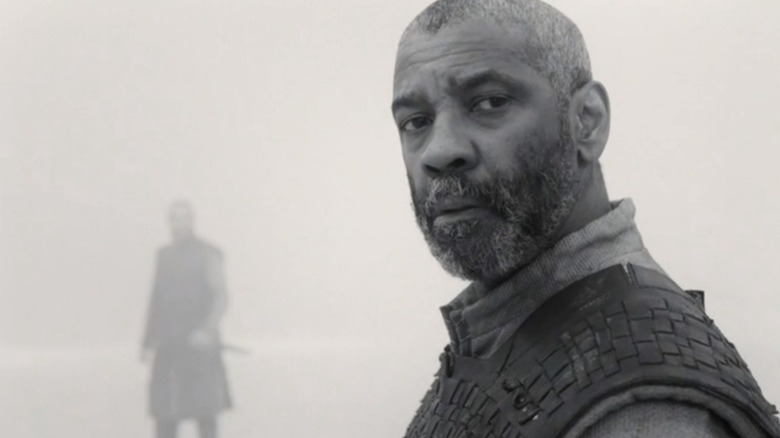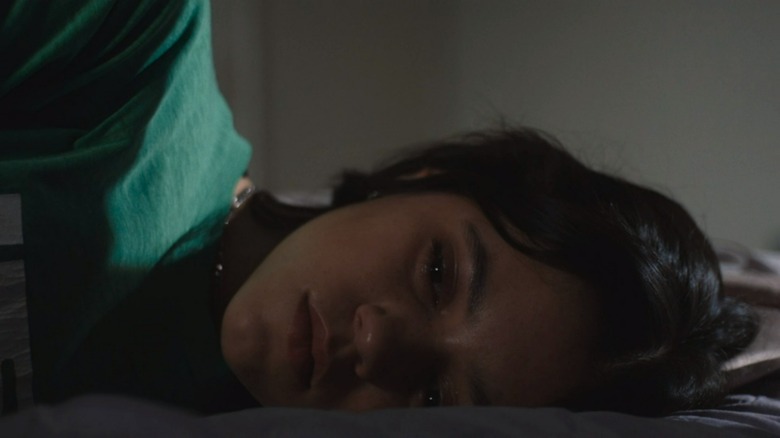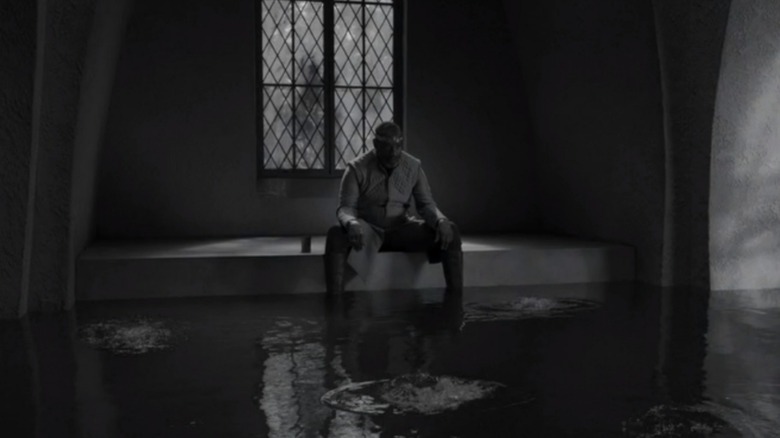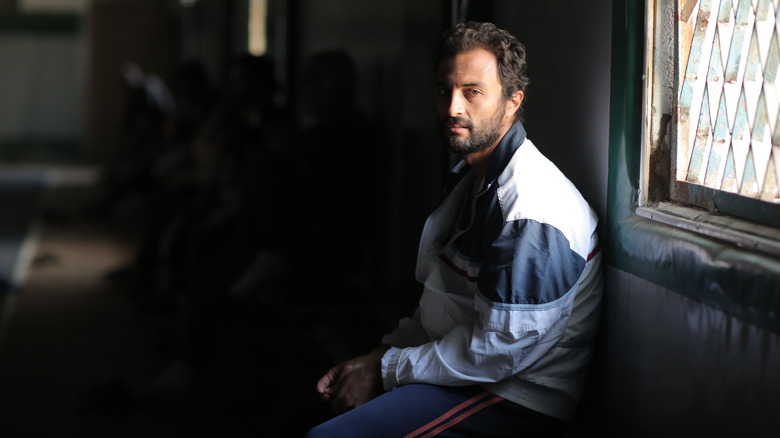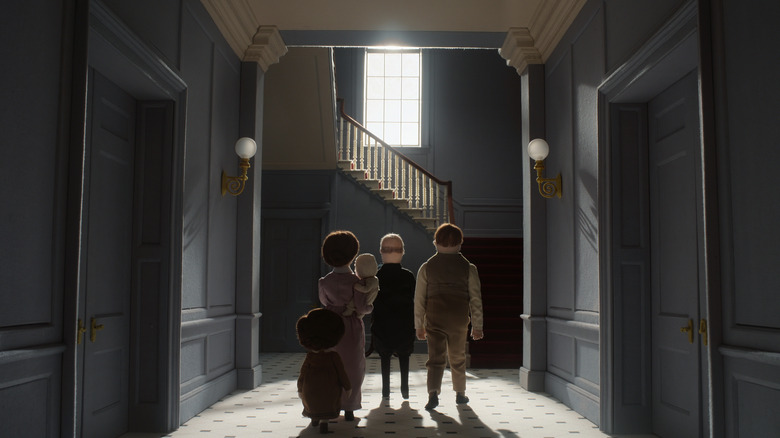Under The Radar: The Tragedy Of Macbeth Is A Surreal Masterpiece & Other Underrated Movies From January
(Welcome to Under the Radar, a new column where we spotlight specific movies, shows, trends, performances, or scenes that caught our eye and deserved more attention ... but otherwise flew under the radar. In this edition: Jenna Ortega shines in two movies, "The Tragedy of Macbeth" embraces the surreal, Asghar Farhadi hits yet another home run, and celebrating the creepy pleasures of Netflix's "The House.")
The very first edition of this column that debuted last month, a look back at 2021 and the year that was, originated (in part) as a response to the type of quality media that, frankly, were simply too good for the industry's major awards voters. As big a deal as the Oscars may be — and they indisputably are, given the positive effect nominations can have at the box office and, anecdotally, among our family and friends — it's equally as hard to ignore every time Hollywood's gatekeepers get things wrong. So with the 2022 Academy Award nominations fully revealed, our next edition of "Under the Radar" couldn't be better timed.
In this month's column, we're giving this past January its proper due. Traditionally dismissed as a wasteland of buried releases and shaky studio gambits, the first month of 2022 ended up chock-full of movies and shows worthy of your time and investment, to various degrees. For those looking for a darker, more adult twist on superheroes and villains, James Gunn's "Peacemaker" series on HBO Max made quite an entrance in early January and kept revealing its surprising depths. Created and directed by Christopher Miller, Apple's murder-mystery series "The Afterparty" debuted on January 28 to overwhelmingly delighted reactions among viewers and critics. Elsewhere, the George Clooney-directed and Ben Affleck-starring "The Tender Bar" arrived on Amazon on the 7th and struck a personal chord with some, action junkies had "The 355" to tide them over, and Netflix singlehandedly provided hours of entertainment with the buzzy premieres of a new Kristen Bell-starring murder-mystery, "Archive 81," "All Of Us Are Dead," and "In From the Cold."
None of those examples quite meet the criteria for our purposes here, but that only goes to show how no month of the year can be discounted anymore. Great new movies and shows are rolling out on a weekly basis, so it helps to slow down sometimes and take stock of the true highlights. Here are my picks for January of 2022.
January belonged to Jenna Ortega
Before landing on HBO Max this past January, writer/director Megan Park's feature debut "The Fallout" first premiered at the South by Southwest Film Festival in March 2021, winning the Grand Jury Prize in Narrative Feature Film Competition along with the Audience Choice Award. The film, detailing the aftermath of a horrific school shooting and one student's fraught journey to navigate her own lingering PTSD, doesn't shy away from its triggering subject matter or the reality that these stories don't lend themselves to clean, happily-ever-after endings. This approach required a young lead actor who could shoulder the responsibility of such a nuanced and moving portrait that far too many American teenagers in recent years have firsthand experience with. According to Park herself, Jenna Ortega was the perfect person for the character of Vada Cavell.
Of course, most audiences last month likely saw Ortega as Tara Carpenter in the recent "Scream" sequel, portraying the rare franchise "opening victim" who actually survives Ghostface's attack and goes on to play a significant role in the film. Though surface-level readings can find plenty of easy parallels between these vaguely similar survivors, Ortega shows off an impressive amount range in these two very different movies. After her exceedingly well-realized opening scene in "Scream," the actor commands the screen throughout her subsequent appearances — even with one arm figuratively tied behind her back, as she's relegated to a hospital bed and a wheelchair for the rest of the film. She may be playing the same single note as Ghostface continues to stalk her, but she does so incredibly well, making the most of what the film gives her.
"The Fallout" almost suffers from the opposite problem, where we remain so fully embedded in Vada's point-of-view that the supporting cast (outside Maddie Zegler, at least) only get one or two moments to shine. Luckily, Ortega proves more than up to the task. Her wonderfully naturalistic take on such a bracing, raw, and frank portrayal of trauma easily sidesteps the kinds of unnecessary and tasteless trimmings that lesser filmmakers than Park might've given into. It's important that, through Veda, teens get to see themselves depicted as inherently likable and well-intentioned, where acts as simple as an empathetic hug can move us to tears. Ortega's authentic performance elevates "The Fallout" to another level entirely, easily positioning herself as a rising star worth paying attention to.
The Tragedy of Macbeth and the art of surrealism
Yup, safe to say I might have a "type." Two of the most rewarding, dense, and uniquely challenging viewing experiences I've enjoyed over the last few years happen to involve modernized reinterpretations of classic texts: David Lowery's "The Green Knight" (which I positively swooned over in last month's column) and, more recently, Joel Coen's "The Tragedy of Macbeth." Both boast genuinely Oscar-worthy performances from their lead actors, both feature some eye-poppingly gorgeous cinematography working in tandem with a firm grasp of visual language, and — most impressively — both go out of their way to shatter the left-brain need for literalism.
Of course, any retelling of "Macbeth" can't fully avoid the abstract nature built right into the original play, which Coen leans into for everything it's worth. Just as Shakespeare made no effort to explain supernatural witches toying with destiny the way a cat might with a ball of yarn, "The Tragedy of Macbeth" finds ways to dramatize this unrealism with thought-provoking richness.
Portrayed with endless menace and terrible power by Kathryn Hunter, the "weird sisters" manifest in reflections, as an old man (another similarity to "The Green Knight," given Alicia Vikander's dual roles), or as portentous crows. An early scene where Lady Macbeth (Frances McDormand) calls on the supernatural to steel herself for murder is accompanied by inexplicable shifting shadows on a white background behind her, as if framed by a Rorschach test. Macbeth's (Denzel Washington) famous visions of an ominous dagger on the eve of committing regicide against Duncan (Brendan Gleeson) and his hallucination of the murdered Banquo's (Bertie Carvel) ghost are translated faithfully and without irony.
All this adds greater subtext and more weight to Macbeth's struggle against fate, where more literal-minded storytelling would've inevitably come up short. Too many stories these days remain stubbornly opposed to taking leaps of logic, doing anything to avoid bringing us into the emotionally volatile headspace of characters in ways more easily felt than understood ... an insidious mindset that can lead to broken, surface-level discussions about "plot holes" and logic nitpicks at the expense of, well, everything else a movie or show has to offer. Thanks to its source material and a creative team that understands the power of surrealism, "The Tragedy of Macbeth" proves there's still plenty of life left in one of the bard's most famous and well-known plays.
Asghar Farhadi reminds us that not all characters need to be A Hero
You wouldn't necessarily think that the concept of flawed characters — essentially the backbone of the vast majority of storytelling throughout human history — would be completely foreign to significant portions of the moviegoing audience, but what I've noticed over the years tells me otherwise. Remember the actual meltdowns some fans suffered in the wake of "Avengers: Infinity War," solely because Chris Pratt's Star-Lord apparently ruined the whole movie because he experienced an ill-timed emotional reaction, or the outraged reactions spewed towards Mark Hamill's Luke Skywalker in "The Last Jedi" for even just thinking (for literally two seconds!) about ending his nephew's life before he caused real harm? Because I certainly do. Somehow, mainstream viewers reached a point where wish-fulfillment and binary thinking completely eclipsed the desire for nuanced, complicated, and refreshingly ambiguous characters.
Thank goodness for Asghar Farhadi, then. The Iranian director has made a career out of crafting some of the most compelling, thoroughly human stories you'll ever see out of the most innocuous of circumstances. A splintering marriage explodes into a parable about the lengths people will go in order to protect their pride in "A Separation." Moving to a new apartment spirals into an unflinching portrayal of fragile male egos in "The Salesman." And in his most recent feature, "A Hero," one seemingly good deed begets nothing but trouble for a would-be Good Samaritan.
In stark contrast to its darkly ironic title, there are no heroes or villains here. For down-on-his-luck Rahim (a phenomenal Amir Jadidi), his girlfriend's chance encounter with a lost bag of valuable gold coins feels like heaven-sent salvation to pay his debilitating debts and leave prison. When stricken by his conscience (along with the pesky fact that an appraisal doesn't indicate enough of a windfall to make it worth his while), he returns the bag to its lost owner and triggers an ever-cascading series of misfortune and lies compounding lies. Characters are flawed, most everyone is "right" in some way, and we're left to helplessly watch it all escalate. Farhadi communicates this through a lengthy shot early on, holding on Rahim walking across a vast, empty desert landscape before ascending endless ladders of scaffolding — so much movement, so little actual progress.
By allowing characters the dignity of making mistakes, "A Hero" proves that failure really is the greatest teacher.
The House is a nightmarish good time
Many of my personal favorite works of art — whether movies, shows, novels, paintings, or poems — manage to capture a hazy, dreamlike sense of reality. Much like actual dreams, they don't restrict themselves to any singular tone or style. For every Terrence Malick or Hayao Miyazaki, you have Stanley Kubrick or David Lynch. For every "Paterson," you have "Annihilation." For every tender and wholesome Laika or Pixar movie, well, let me introduce you to Netflix's "The House."
Over the course of three separate vignettes, linked only by a shared location (the eponymous house) and certain thematic underpinnings, "The House" takes viewers on an unsettling, creepy, and sometimes confounding ride through nightmarish circumstances.
That certainly applies to young Mabel (Mia Goth) in the first, vaguely 1800s-set chapter, who finds her whole world turned inside out when a mysterious architect offers her destitute father a chance of a lifetime: sell their humble cottage and move to a gorgeous new house with absolutely no strings attached ... that they can see, at any rate. What at first merely seems off turns into a full-blown waking nightmare as sinister strangers, a constantly reshaping house, and her parents' trancelike apathy show the extent of just what the family gave up for the sake of material comfort. The next 30-minute short, set in the present-day, follows an anthropomorphic rat known as the Developer (Jarvis Cocker) fixing up the exact same house with a mix of tenacity, desperation, and maybe a few shortcuts. His nightmare is more of a slow-boiling pot, beginning with a nagging beetle infestation and expanding to a pair of interlopers who refuse to leave the house. Finally, the third features the feline landlady Rosa (Susan Wokoma) subletting the now-dilapidated house to a pair of deadbeat tenants who help her let go of her misguided dream.
Not since "Coraline" can I recall seeing any animated movie that feels ripped from the churning subconscious of children tossing and turning in uneasy sleep, perhaps after watching some of the "Indiana Jones" trilogy's more grisly moments of face-melting, heart-plucking, or supernatural-aging at a slightly too-young age. (That was me. I'm describing younger me, for the record.) The plots of all three chapters don't unfold in an entirely logical manner, but through dream logic that the characters and, by extension, ourselves are desperate to wake up from. Don't miss this.
